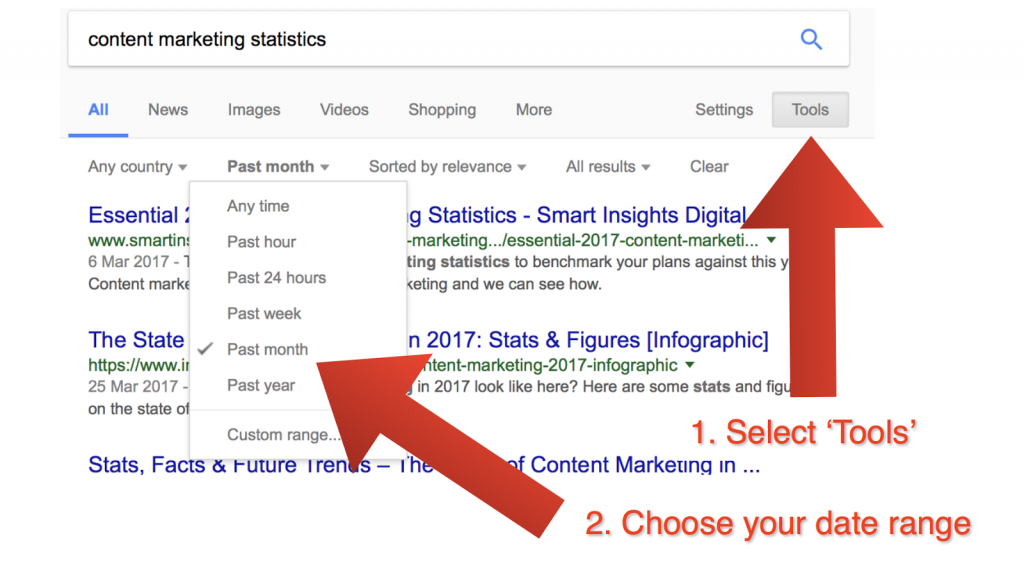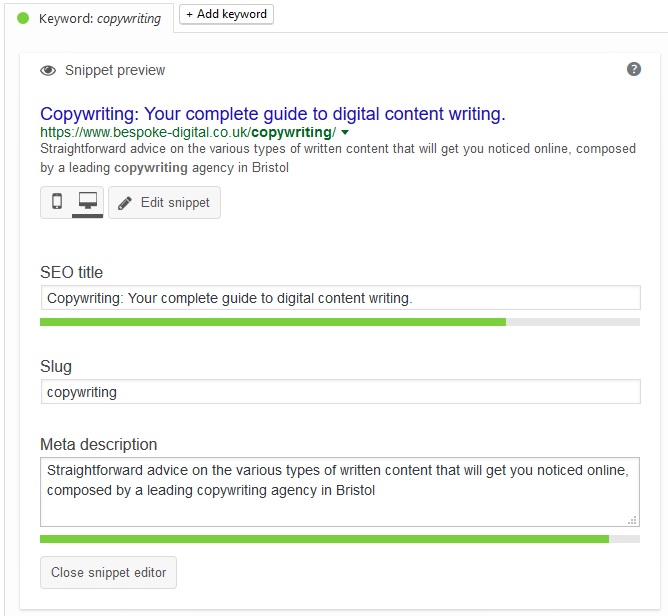If you’re in the marketing world, you’ll no doubt be familiar with the copywriter’s role in producing written content to raise brand awareness and, ultimately, persuade targeted audiences to take action. In essence, copywriting is the art of persuasion using words.
Traditionally, copywriters have resided in the world of direct advertising – crafting messages that influence purchases – but when it comes to online marketing, the boundaries have become somewhat blurred, with much debate reigning over what differentiates a copywriter from a content writer.
Copywriting vs. Content writing
While sales copy remains a vital part of the purchasing process, the theory behind thoughtful content marketing is to provide value for your audience in a number of ways, such as detailed how-to guides, informative blog posts, insightful case studies and entertaining social media snippets, etc.
The idea is to ‘tell’ rather than ‘sell’, subtly framing you as an authority in your industry without overtly promoting your products or services, gaining recognition and respect in a manner that should hopefully convert a fair portion of readers into brand advocates and potential customers.
As such, online copywriting has evolved to incorporate the philosophies of content marketing, meaning copywriters and content writers can now broadly be considered to be one and the same beast.
Quality copywriting should be at the heart of every successful content marketing strategy, underpinning each piece of work to frame you in the best possible light, while also gently nudging prospects down your sales pipeline.
For further insight on doing it right, here’s our insider’s guide to online copywriting that will whet your customers’ appetite.
Avoiding a bog-standard blog
In the Internet Age, most businesses appreciate the benefits of blogging; it gives you a platform to showcase industry knowledge, demonstrate your company culture and attract visitors to your website (whether through organic search listings or social media marketing) – acting as the perfect vehicle to qualify your expertise and neatly direct readers to your service pages.
However, there’s a real skill to crafting content that captivates, so bear the following steps in mind to prevent your blog from becoming a dreary slog.
- Don’t just write about what you want to write about. Do some research to ensure you’re answering the questions that people actually want answering. We’re big fans of Answer The Public – a great tool for keeping your content focused as it allows you to see exactly what people are searching for in relation to your business niche. If you can directly answer popular questions, you’ve got a much better chance of ranking highly in the organic search results.
- Where appropriate, a good writer should always back up their words with evidence, and this is especially the case in the blogger’s domain. If you’re building an argument to demonstrate your expertise, you’ll need to reference your sources and link to up-to-date information that reaffirms your beliefs.Unfortunately, however, we come across too many blog posts that either quote outdated research or reference somewhat suspicious statistics. Doing so can seriously undermine your credibility and reflect negatively upon your brand, so make sure you do some digging before latching onto the first nugget of data that backs up your point.
Google is likely to be your first port of call when looking for stats, and you can avoid the drudge by filtering your search results. Simply select ‘Tools’ below the search bar, and explore the various advanced features that allow you to refine searches, such as only returning web pages that have been published in the past month.

Taking care with your research is becoming increasingly important as Google expands its fact-check feature to worldwide searches. Simply put, if you spout false information, you’re less and less likely to rank well. Facebook is also taking steps to eradicate ‘fake news’, warning users on what to look out for. Expect to see this trend growing in adoption rates and sophistication in the coming years.
- Once you’ve figured out what you’re going to write about, you need to pay particular attention to the headline. Nine times out of ten, the headline will be the first thing that people look at when browsing search results or social media feeds, so it’s crucial to come up with something eye-catching that also fulfils promises, i.e. doesn’t go down the clickbait route of sensationalism if your content can’t possibly live up to expectations.Headlines should be as specific as possible, containing just enough information to tell people exactly what you offer and who you target. ‘Grow your company’, for example, is too broad to be effective. ‘Get 35% more copywriting clients in 3 months’ is much more specific and highlights exactly who your target is and what they’ll get out of reading your article.
Specific headlines are more appealing, more believable, and more attractive to the right people. For further insight, you can read our guide to creating great headlines for content marketing.
- Now that you’ve done the groundwork, it’s time to start actually writing your copy. The key thing to bear in mind is to do the ‘I’ test, i.e. beware of how often you use words like ‘me’, ‘our’ and ‘we’.It may sound a little harsh, but most people will tune-out if you constantly bang on about yourself and your theories, so you need to concentrate on telling your readers what’s in it for them, using ‘you’ focused words.
So far, reviewing this very blog post, there have only been two uses of the word ‘we’, and two uses of ‘our’. However, there are a whopping 40+ variations of ‘you’, ‘your’, ‘you’re’ and ‘you’ll’, so hopefully you’ve enjoyed yourself up to this point, and will continue your journey reading the rest of the page…
Keywords in your copy
You could be the most eloquent writer in the world, but if you fail to conduct effective SEO keyword research your content won’t reach its full potential.
Much has been written about the shady days of keyword-stuffing – when people would ram their content full of indecipherable gibberish, chucking in every possible combination of keywords and phrases in the hope of ranking highly in the SERPs, regardless of whether it actually read well or not – and, as a result, SEO still has a bad name in the eyes of some.
If you’re a purist, you may think that the art of writing should not be compromised by some form of engineering to insert a targeted word or phrase, but such stubborn thinking won’t serve you well, as you’ll be missing out on a huge audience of keyword-searching surfers.
Going granular and analysing this very blog post once more, ‘copywriting’ is the primary keyword we’re targeting here. On the one hand, we’ve written this guide to showcase our knowledge on the matter, hopefully qualifying us as expert copywriters. However, from a search perspective, we’re also looking to push as many potential customers our way as possible, so if you glance to the top of the page, you’ll see that the URL, Page Title, Header 1 and Header 2 all contain variations of the term ‘copywriting’, as does the meta description (which appears in search listings).

These, along with the actual words on the page, are the primary indicators that help search engine bots better understand what our content is about and, ultimately, which keywords and phrases each page will rank for. Structuring your content in such a way and taking time to appreciate the intricacies of onsite optimisation will help ensure your copy doesn’t go floppy when put to the test of being found.
However, it’s important to reiterate that you shouldn’t stuff every possible combination of keywords and phrases into your content if they don’t read naturally. Having a plan of what words you’re targeting in mind is certainly a necessity in the online world, but don’t go overboard if it doesn’t sound right.
Writing this guide also gives us an opportunity to link to our copywriting service page using the word ‘copywriting’ (up there in the opening paragraph) – raising the authority of said page, telling Google that it is highly relevant for people in need of copywriting services, helping prospective clients find us that little bit easier.
Search engines read links within your site as a signpost, so by using appropriate anchor text (i.e. the words you want each page to rank for) when linking between pages, you’re making that page visible and boosting its relevance for the term, giving it a natural bump up the search listings.
Understanding the benefits of search engine optimisation will help you create much clearer content that works harder for you in the long run, amplifying it to audiences that may otherwise not stumble upon it. We firmly believe that quality content will always shine through, but you’ll be doing yourself a fundamental disservice if you don’t take SEO seriously.
Sell, sell, sell
While the mainstay of content marketing is to offer valuable advice over sales messaging, there are still times when it’s appropriate to steer your readers in the right direction. For instance, after writing an informative guide (such as this one) you’ve earnt the right to sign off with a quick ‘for more information, get in touch’ type message, usually linking to your contact page.
However, there are times when you’ll want to be more direct, particularly for product/service pages and landing pages if you’re running a pay-per-click campaign. This is where the more traditional side of copywriting comes in, carefully selecting the right words to drive sales, downloads or signups – whatever your desired action may be.
Ultimately, the key to the reader’s heart is to emphasise the benefits of your product/service rather than harp on about the exact features. If you fall into the trap of spouting industry jargon, you risk alienating the uninitiated and potential customers will soon lose interest.
When Internet providers promote their services, for example, they don’t simply list the speed of their new broadband; they tell you how this can impact your life, i.e. no buffering when streaming videos, or no lag when playing online games.
Making things relatable appeals to the emotions, tempting people to think about your offerings on a much deeper level.
 The best way to qualify what you say is to leverage testimonials, short quotes from happy customers that prove you really can deliver the goods. We have a couple of testimonials on each of our service pages, statements that stand out amongst the descriptions of what we do, and they help reassure prospects that we can achieve similar results for them. Likewise, in-depth case studies are key to converting prospects into sales as they allow site visitors to learn how we operate in more detail.
The best way to qualify what you say is to leverage testimonials, short quotes from happy customers that prove you really can deliver the goods. We have a couple of testimonials on each of our service pages, statements that stand out amongst the descriptions of what we do, and they help reassure prospects that we can achieve similar results for them. Likewise, in-depth case studies are key to converting prospects into sales as they allow site visitors to learn how we operate in more detail.
When it comes to calls to action, the culmination of all your work and the final big push to inspire action, bear these principles in mind:
- Use commanding language at the start of your CTA, such as ‘Buy’, ‘Shop’, ‘Download’, ‘Subscribe’ or ‘Order’.
- Provoke a response using limited-time offers, such as ‘Buy today and receive 50% off’, or ‘Join today for exclusive member benefits – offer ends Friday’, ‘Call today for a free content audit’.
- Make it simple for people to follow through, i.e. create a CTA button, or at least a link, that users can press to take them to the next page.
- Create an inverse pyramid, centralising your copy over two or three lines and placing your CTA at the very bottom. This subconsciously draws the eye and ‘points’ directly to the CTA, encouraging readers to click away.
- They real key to CTA optimisation is to regularly test the waters, trying out different variations until you hit gold. Don’t neglect your web pages once they’re published – be sure to analyse page activity and ask for feedback on what could be improved.
Copywriting and content marketing: Two strings of the same bow
Digital copywriting is continually evolving with new best practices cropping up all the time, but one constant remains: the way to really stand out from the crowd is to combine the art of traditional copywriting with the science of SEO, ensuring you create powerful messages that get seen by the right people.
If you’d like further guidance on how to amplify your efforts, call us today to receive a free content marketing appraisal and see how we can help you achieve your goals.
Related Topics:
If you have any comments or questions about this post, or would like to discuss a specific issue with your site, please get in touch using the form below.
And connect with us on social media to stay upto date with our latest news:

